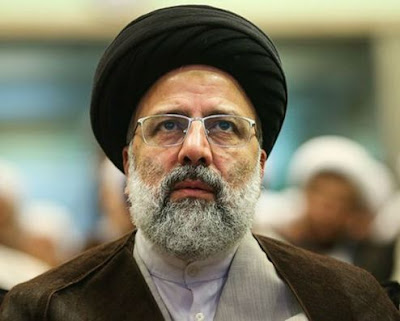The head of Iran’s hardliner Judiciary issued a new directive June 6 advocating a separate treatment for “political crimes” by those who criticize the country’s clerical rulers from “security crimes" by those who question the very essence of the regime.
The Islamic Republic has Article 2 of the Political Crimes Act, which includes insulting the heads of three branches of power, as well as offenses related to elections and "spreading false news" counted as "political crime".
But, almost all dissidents are usually accused of security crimes, without a public trial by a jury as inscribed in the constitution.
In the new directive, the mid-ranking cleric Ebrahim Raeesi (Raisi) has stressed the need to investigate people accused of "insulting" sanctities, the Islamic Republic Supreme Leader, and senior Shiite clerics for political crimes as part of “security crimes”.
This would still keep the door open for charging dissidents who criticize the country's ruler, Ali Khamenei, for "security crimes"
In 2016, Majles (Iran’s parliament) passed a law defining "political offenses" that would guarantee public trials, a measure cautiously praised by President Hassan Rouhani’s so-called "moderate" government as a step towards reform but faulted for not being comprehensive enough. Legal experts also criticized the law as vague and incomplete.
Article 262 of the Islamic Republic Penal Code also stipulates that "Anyone who swears at the Great Prophet [of Islam] or any of the Great Prophets, shall be considered as Sāb ul-nabi [a person who swears at the Prophet], and shall be sentenced to the death penalty."
Article 514 of the Islamic penal Code also states, " Anyone who, by any means, insults Imam Khomeini, the founder of the Islamic Republic, and/or the Supreme Leader shall be sentenced to six months to two years imprisonment."
According to human rights activists and attorneys, the Islamic Republic Judiciary has a long history of applying Article 2 to persecute dissidents and critics of the establishment in the Shi'ite clergy-dominated Iran.
According to Article 1 of the 1995 law, the offenses mentioned in the law are considered political provided "the perpetrator had not intended to question the core of the regime."
Furthermore, it stipulates that it will be up to the courts to determine whether a crime committed had a "political" nature or not. Even if a suspect insists that the offense attributed to him has a political nature, once again, it is up to the court to reject or accept the claim.
According to Article 168 of the Constitution of the Islamic Republic, the investigation of political and media crimes must be carried out in public and in the presence of a jury, but no law was enacted for it since the establishment of the Islamic Republic (1979) until 2016.
Nonetheless, no one has been tried for a political crime, so far.
Officials in the Islamic Republic have repeatedly claimed that there are no political prisoners in Iran, and those "presumed" political prisoners are mere "security" offenders behind bars.
It is also not clear if Raeesi’s gesture in issuing a directive reiterating the 1995 law is a genuine decision to separate political offenses from “security crimes, or it is just part of his strategy to appear reasonable and moderate.
Many in the Iranian media have said that Supreme Leader’s hand-picked chief judge who heads a huge and unaccountable judicial bureaucracy is positioning himself as the next president or ultimately as successor to Ali Khamenei.
Source: radiofarda.com, Staff, June 7, 2020
⚑ | Report an error, an omission, a typo; suggest a story or a new angle to an existing story; submit a piece, a comment; recommend a resource; contact the webmaster, contact us:
deathpenaltynews@gmail.com.
Opposed to Capital Punishment? Help us keep this blog up and running! DONATE!
"One is absolutely sickened, not by the crimes that the wicked have committed,
but by the punishments that the good have inflicted." -- Oscar Wilde













Comments
Post a Comment
Constructive and informative comments are welcome. Please note that offensive and pro-death penalty comments will not be published.